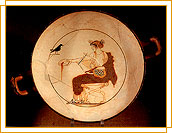The truce during the games
Truce was declared before the beginning of the Olympic Games,
 during
which all the Greek cities suspended hostilities for a specific
period of time. during
which all the Greek cities suspended hostilities for a specific
period of time.
The institution of the truce was established during the reformation
of the Olympic Games in the 8th century BC. It
is believed that the ones responsible for it were the kings
of Elis, Pisa and Sparta, Iphitos, Kleosthenes and Lycurgus
respectively, who signed a treaty, the so-called Sacred Truce.
The immediate objective was to stop the hostilities among
the people of the Peloponnese, but essentially it was a treaty
respected by all Greeks. Several researchers related this
truce to similar cases, known particularly from the Homeric
epics, where hostilities were suspended in order to pick up
the dead from the battlefields, bury them and organize games
in their honor. It was a treaty respected by both sides.
The ancient traveler Pausanias mentions that when he visited Olympia in the 2nd century AD he saw that among the sacred objects guarded in the temple of Hera was the so-called Iphitos' bronze disc, upon which the text of the truce was written. According to it, Elis and Olympia were declared sacred territories and armies were forbidden there.
The truce was announced to the entire Greek world and all the cities that send their athletes to the Games and accepted the sacred libations were obliged to suspend all military operations during the Games. This period lasted from one to three months, the time needed for the athletes and visitors to arrive undisturbed in Olympia, watch the games and return to their cities in safety. Thanks to this institution, the Olympics assumed great status among the Greek cities. The territory of Elis in particular, where Olympia was situated, became very wealthy and its population increased.
However, during the years in which the Olympic Games took place there were instances when the sacred truce was violated. In 420 BC Sparta was eliminated from the Games with a fine of 2,000 mnas, because it attacked Lepreo, while in 362 BC the Eleians fought against the Pisatans in the area of the temple itself.
In brief the terms of the truce were the following:
- All hostilities were suspended, while the state of Elis was declared neutral and accessible to all. The athletes and visitors from cities engaged in war could travel safely through enemy territories.
- Armies and weapons were forbidden in Elis' territories.
- During the truce no death penalty was carried out.
|
